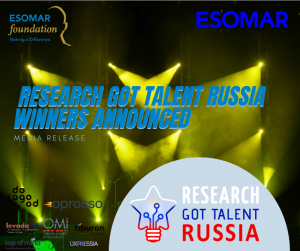
The global ESOMAR Foundation and the general partner of the competition in Russia The Platform for Social Change ‘todogood’ announce the winner for the Research Got Talent Russia competition that was conducted on June 19.
The competition encourages young professionals to use market research and insights to support local charities and NGOs to overcome pressing social issues. There were 16 teams made up of young researchers below the age of 35 from different companies, research agencies, and universities in Russia. Each team was allocated a charity/NGO at random; they were required to submit a project proposal about the issue facing the charity/NGO and how they would conduct research to assist them to overcome this issue. Entries were required to reflect a relevant, innovative, and impactful research design project that assesses the organisation’s specific issue. The research projects in the competition aimed to assist change in a broad range of areas and detailed analytic reports were then produced. The research project themes included preserving cultural heritage, assisting migrants and refugees, supporting children with illnesses, and even researching the real and potential audience of mini football.
‘It is important that Russian sociologists are ready to actively work with the non-commercial sector. The teams prepared a detailed analysis concerning the most relevant and important questions of the NGO’s; the quality of the research is the result of the professionalism and enthusiasm of all teams’ – noted Alexander Shashkin, ESOMAR Representative in Russia, CEO of OMI (Online Market Intelligence).
The three finalists were announced, and the winner was the MediaCom Knowledge corporate team for their work in association with Committee for Civil Initiatives. The NGO seeks to support migrants and refugees, providing them with necessary documents, as well as standing up for their rights by changing the attitude that the government and society have towards them. The aim of the research was to identify a portrait of potential private donors for the NGO. The answers of 2,000 respondents were recorded and an analytic report subsequently produced. The tip of the iceberg, some important figures and conclusions, were then shared during the videoconference. For example, the research showed that although only 2% had donated to support migrants and refugees over the past year, although 26% are ready to help if provided with enough information about the cause.
The committee head of Committee for Civil Initiatives, Svetlana Gannushkina, was very pleased with the results of the research: ‘I want to say a huge thank you for the work. As you have heard, we are working with migrants and refugees, and this is a group that experiences xenophobia all over the world. It is a moment of joy for me, as the group (of researchers) provided the information that the public in Russia is not lost for us and is willing to help this cause.’

The silver medalists were the Truestory team who worked with Samara Hospice NGO. The NGO has an inpatient stationary unit as well as a network of ambulances and consists of doctors and nurses who care for patients with palliative statuses who cannot be cured. The aim of the research was to investigate the scale of opiophobia in society and in the healthcare community as well as to reveal the main obstacles in anti-pain therapy appointment and give the recommendations how to overcome them. One of the highlights of the research was that trained medics were more likely to consider living with pain an abnormality than other members of the society did. The research also showed that levels of opiophobia were not very high amongst the respondents.

The Reverse Influence team together with ORBI Foundation came in third place. Reverse influence is a corporate team of the Russian Public Opinion Research Center (WCIOM). ORBI Foundation is a specialized fund that deals with the problem of stroke in Russia. It helps people who have faced the disease and their relatives, supports medical institutions, and draws public attention to the problem of stroke. The research aimed to identify how much the public knew about the stroke and its effects, and to assess the quality of social support for those who suffered.

The Mediacom Knowledge team will now enter the final ESOMAR’s Research Got Talent global competition. Winners from each region participating in the global competition will present their work to an international audience at the special ESOMAR event in Autumn 2020. The winner will also be given the floor at the ESOMAR Congress 2021 to be held in Toronto, Canada.
The judges for Russia’s Research Got Talent Award competition included:
- Maria Akulich / The Platform for Social Change ‘todogood’, Head of the NGO Department
- Elvira Aleynichenko / Head of the Centre for Managing Social Innovations ‘GrantRafting’
- Vyacheslav Bakhmin / Polytechnic Museum Foundation, Head of the Expert Council
- Julia Bogdanova / KPMG, Senior manager
- Olga Drozdova / Agency of Social Information, Head of the Programs
- Igor Zadorin / NGO ‘Sociological workshop of Zadorin’, Founder and CEO
- Ivan Klimov / Social Business Group, Managing Partner
- Julia Romaschenko / Charities Aid Foundation Russia, Head of Programs and Donor Relationships
- Roman Sklotsky / Vladimir Potanin Foundation, Director of the Centre for Philanthropy Development
- Dmitry Sosnin / Committee for Civil Initiatives, Project Coordinator ‘Municipal Map of Russia: Areas of Growth’
ESOMAR Foundation and Todogood would like to acknowledge and thank the generous sponsors for helping make this exciting initiative possible: Oprosso – survey programming platform, OMI (Online Market Intelligence) – B2C online panel, LevadaLab – Telegram messenger research bot, Tiburon Research – online qualitative research platform, Top of Mind – surveys with doctors and nurses, UXPressia – UX research platform.
According to all participants of the final event, great work was done, and many members would like to continue to participate in the ESOMAR Research Got Talent initiative. The organizers are also planning to disseminate the knowledge that was created via local publications, webinars and the virtual library.
For further information:
Author
Fyodor Shashkin

